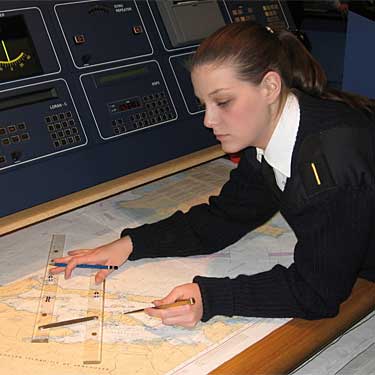Brian Morton, Vancouver Sun; Canwest News Service
Published: 2:36 am
More than a few people would pay a king's ransom for the same trip
that Kristina Rivette began last month.
On Feb. 15, the 22-year-old Rivette arrived in New York City to board
the Cunard Line's luxury ocean liner RMS Queen Mary 2 en route to several ports in the
sunny Caribbean. From there, it's on to England and possibly the Mediterranean before
returning to New York and starting all over again.
But instead of paying thousands of dollars for the 16-week voyage,
Rivette will be paid a regular wage as part of a cadet training program offered by
Vancouver's B.C. Institute of Technology (BCIT).
"It's absolutely amazing that this opportunity happened," Rivette
said in an interview. "They hired me through Princess Cruise Lines and this is where
they placed me. I'm a deck cadet (on the Queen Mary 2). I'm training to be an
officer."
Rivette -- the only Canadian on board the vessel as part of the
program -- is serving the first of three co-op sea phases required of all students in
the BCIT Marine Campus's four-year nautical sciences diploma program.
"Our company supports in-house cadet training and has worked with the
BCIT Marine Campus for many years to recruit and train deck, engineer and
electro-technical cadets and officers," Don Millar, senior fleet manager for Carnival
Group, whose cruise brands include names such as Cunard Line, P&O Cruises, and
Princess Cruises, said in a statement.
According to a release, companies such as Carnival, based out of
Southampton, England, were recently invited to the BCIT Marine Campus to interview
first-year nautical sciences students.
Rivette, who wants to become a cruise ship captain, was offered the
position in January and will do many different jobs on the Queen Mary 2, which is over
300 metres in length and carries 3,000 passengers and a crew of 1,253.
"I'll do a little bit of everything," she said. "I'm not sure what to
expect. There will be training on the bridge (and) we can use all the ship's
facilities. I'll be doing chart work and taking fixes with sextants. And I'll do a lot
of chipping and painting on deck."
Rivette said she'll be paid a cadet's wage and all food and
accommodation are provided free of charge.
Jeff Otto, co-ordinator of cadet programs in the nautical sciences
program, said there is a huge industry-wide need for their graduates and that the
program's focus is on big-ship, deep-sea experience. "The Great Lakes are a big
category. Thirty-five per cent of our intake goes there on bulk carriers, self
unloaders and oil tankers. Another 35 per cent are on the cruise ship side."
Otto said their nautical science program takes 18 students a year and
their marine engineering program another 16.
Graduates have no trouble finding work and the pay can be quite
lucrative, Otto said.
"Once they get their Transport Canada certification, the pay is about
$10,000 a month (as a mate). On the Great Lakes, they would probably only work six
months of the year, but there's also overtime.
On international deep-sea ships, they would work eight months of the
year. Captains make well over six figures on the Great Lakes (and) first mates make
about $91,000 a year. And they're flown from all over the country, including B.C.
"Once they get their higher-level ticket, they're licensed to print
money. And it's a matter of where they want to work, not if."
Otto said several of Rivette's classmates are scheduled to head
overseas on their own co-ops, including two heading to a cruise ship in Australia, one
to a ship off Dubai and two others scheduled to join a ship on the west coast of
Africa.
He said the Chinese-owned China Shipping Container Lines is a big
employer, but that it doesn't present a problem for his graduates because the
international language at sea is English.
"BC Ferries is not a big employer, because it's not deep sea," he
added.
Otto said graduates of the nautical science program are thoroughly
trained to be "solely in charge of a navigational watch on the bridge of any ship of
any size anywhere in the world." Engineering graduates, he added, are trained to be
responsible for the "engineering watch of the propulsion equipment and auxiliary
systems on any ship."
He said their cadets, who are predominantly from B.C., are mostly
between 18 and 26 years of age and that 10 to 15 per cent are female.
Those interested in such a career, he added, "have to be OK to be
away from home and family for three to six months (a year) and have a desire to travel
and work internationally."
According to the release, nautical sciences graduates are awarded a
Diploma of Technical Studies. Also, upon completion of all prerequisites, they receive
a Watchkeeping Mate Unrestricted Certificate of Competency in the third year, and the
First Mate Intermediate Certificate upon final completion of the program.
Graduates of marine engineering will receive the fourth-class motor
certificate of competency, and the third-class motor certificate upon final completion
of the program.
Capt. John Clarkson, associate dean of the BCIT Marine Campus, said
in a statement: "We are very proud of our relationship with the cruise ship industry,
especially Princess/Cunard and the subsequent international recognition of our
excellent nautical sciences and marine engineering students."
The BCIT Marine Campus offers many courses and programs in
navigation, marine engineering, seamanship, maritime and maritime security.
The campus, in co-operation with the Justice Institute of B.C., also
offers training in marine firefighting at the Fire and Safety Training Centre in Maple
Ridge.
© The Edmonton Journal 2008

